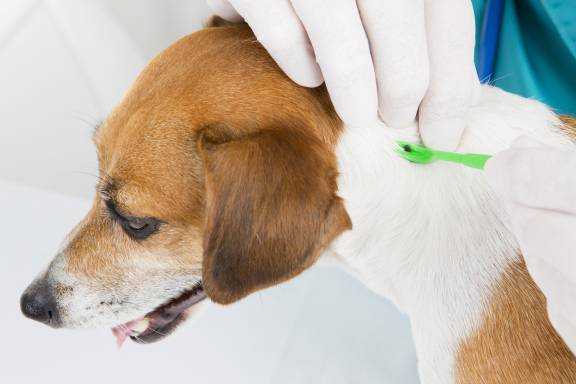Connect with a verified veterinarian in minutes. Licensed vets are available 24/7 to answer your questions. No need to worry about your furry family member.
You and your dog go rambling in the woods and spend a fun, relaxing afternoon. Then it’s time to head home. When you get home, you check your dog for ticks and find one latched on! What should you do?
Should you call the vet when your dog has a tick? The answer is that it depends.
Do You Know How to Safely & Correctly Remove the Tick?
Do you know how to correctly remove a tick from your dog? If not, you may want to call the vet. It’s important to get the entire tick removed. Sometimes you may only remove the body, and the head’s still attached. Leaving the head in the dog’s skin could lead to an infection.
So, if you know how to safely remove a tick and you get the entire tick off your dog, it’s not necessary to call the vet.
Removing the Tick Was Not Successful
Even when you know how to correctly remove a tick, it can happen that the head or part of the body remains attached to your dog. In this case, it’s best to call the vet.
The vet has tools to remove even tiny pieces of the tick that are still attached. In addition, the vet can check your dog for additional ticks. While you checked your dog and found only one, it’s easy to miss others that may be on your dog.

Review symptoms, medications & behavior to keep your pets healthy with a Vet Online in just minutes.
Ask a Vet Live NowAny Doubts? Call the Vet
If you have any doubts or worries about the tick, it’s always best to call the vet. Not only can the vet safely remove the tick and check for others, but they can also determine the type of tick. Certain ticks carry illnesses that can be dangerous for dogs and humans. If the vet finds such a tick, they can recommend treatment right away.
You Removed a Tick & Now Your Dog Has Become Ill
You’ve removed a tick and then a few days later your dog is showing signs of illness. In this case, we would also recommend calling the vet. Ticks carry a wide range of diseases that can affect dogs. Ticks can make dogs sick with:
- Lyme disease
- Canine bordetellosis
- Rickettsial diseases
- Rocky mountain spotted fever
- Canine ehrlichiosis
- And many more
You may notice these symptoms if your dog develops a tick-borne disease:
- Diarrhea
- Muscle pain
- Swelling in limbs
- Seizures
- Fatigue
- Depression
- Skin lesions
- Discharge from nose or eyes
- Weight loss
- Unexplained bleeding from nose (dog may literally sneeze blood)
- And more
If your dog seems ill after being bitten by a tick, it’s always best to call the vet. Don’t wait to see if your fur baby gets better. Tick diseases can become worse and harder to treat over time. They’re best caught in the beginning.
So, there you have it! Use these tips if your dog has a tick, and remember that prevention is always the best medicine. However, even when you use tick prevention products, your dog could still have a tick that latches on. So, regularly check your canine companion for ticks and call the vet if you have any concerns or issues with tick removal.
Connect with a verified veterinarian in minutes. Licensed vets are available 24/7 to answer your questions. No need to worry about your furry family member.

Julie
Julie is a graduate of the University of North Carolina, Wilmington, where she studied Animal science. Though contrary to the opinion of her parents she was meant to study pharmacy, but she was in love with animals especially cats. Julie currently works in an animal research institute (NGO) in California and loves spending quality time with her little cat. She has the passion for making research about animals, how they survive, their way of life among others and publishes it. Julie is also happily married with two kids.
Review symptoms, medications & behavior to keep your pets healthy with a Vet Online in just minutes.
Ask a Vet Live Now

